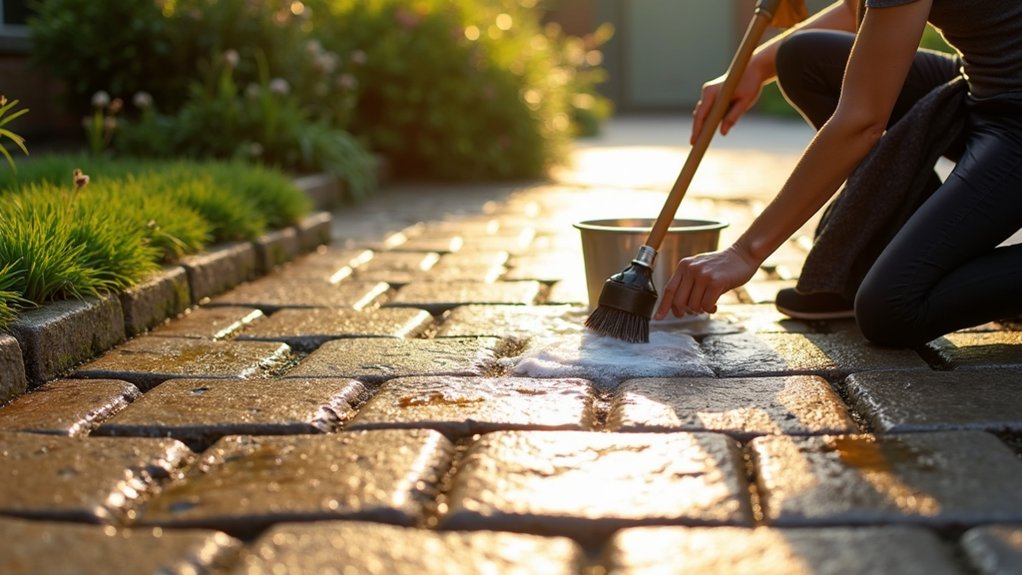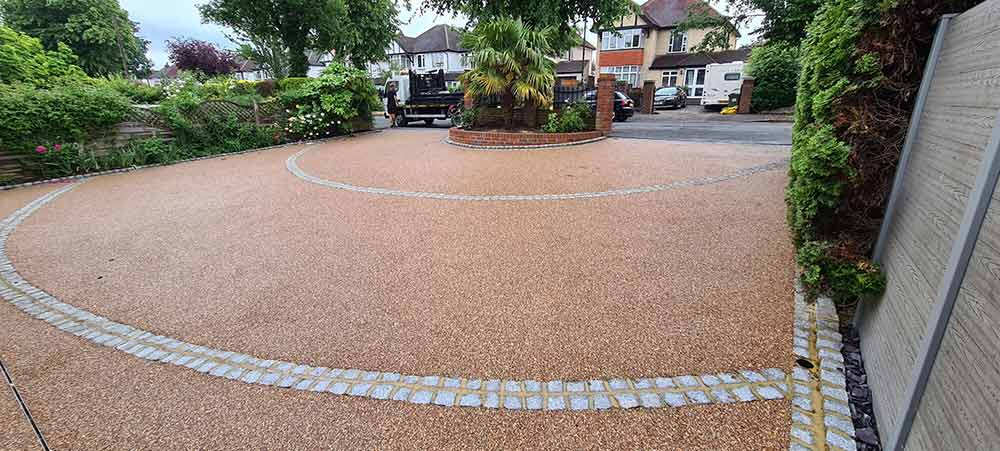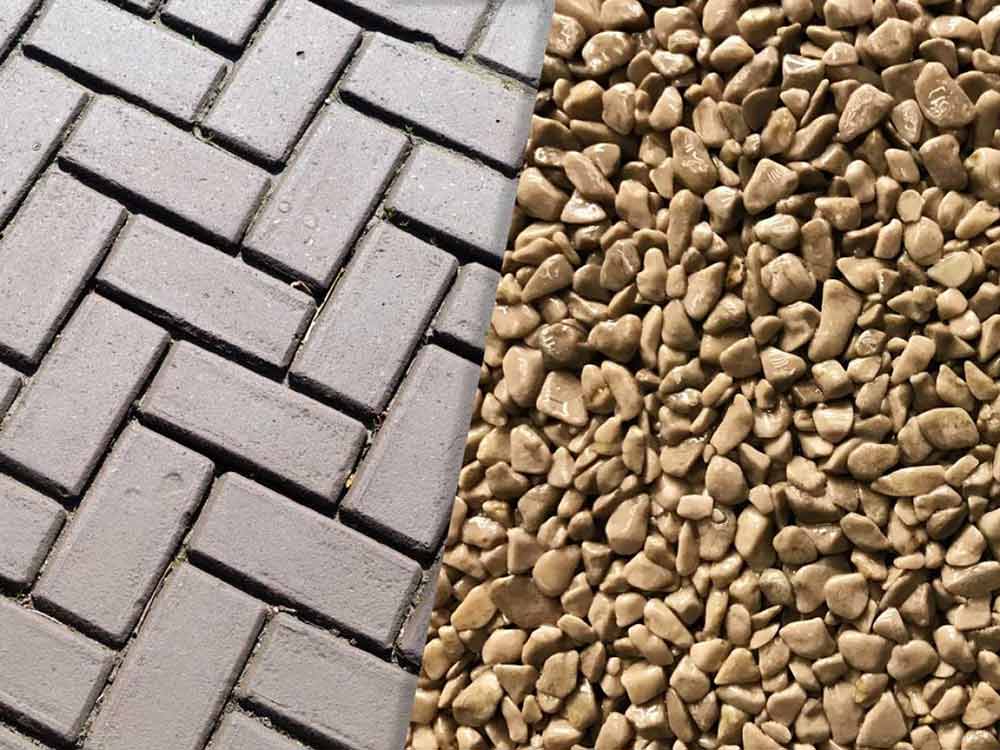To clean your block paving driveway without causing damage, begin by clearing away loose debris and any stubborn weeds. Mix a mild soap solution and apply it evenly using a sprayer. Gently scrub the surface with a stiff-bristle brush, steering clear of harsh chemicals. When using a pressure washer, keep the nozzle at a 45-degree angle to prevent damage. After cleaning, refill the joints with sand and think about applying a sealant for extra protection. Also, look into effective weed control methods and seasonal care tips to maintain your driveway’s longevity.
Table of Contents
ToggleKey Takeaways
- Before cleaning, check the driveway for any stains or damage to prevent further complications during the process.
- Use a pressure washer fitted with a rotary head attachment, keeping it at a 45-degree angle to avoid damaging the surface.
- Opt for mild soap for cleaning; steer clear of harsh acid-based cleaners as they can damage the paving materials.
- Make sure the surface is completely dry before applying jointing sand and sealant to ensure proper adhesion and protection.
- Regularly sweep and inspect your driveway to prevent debris accumulation and prolong its lifespan.
Preparation Steps for Cleaning
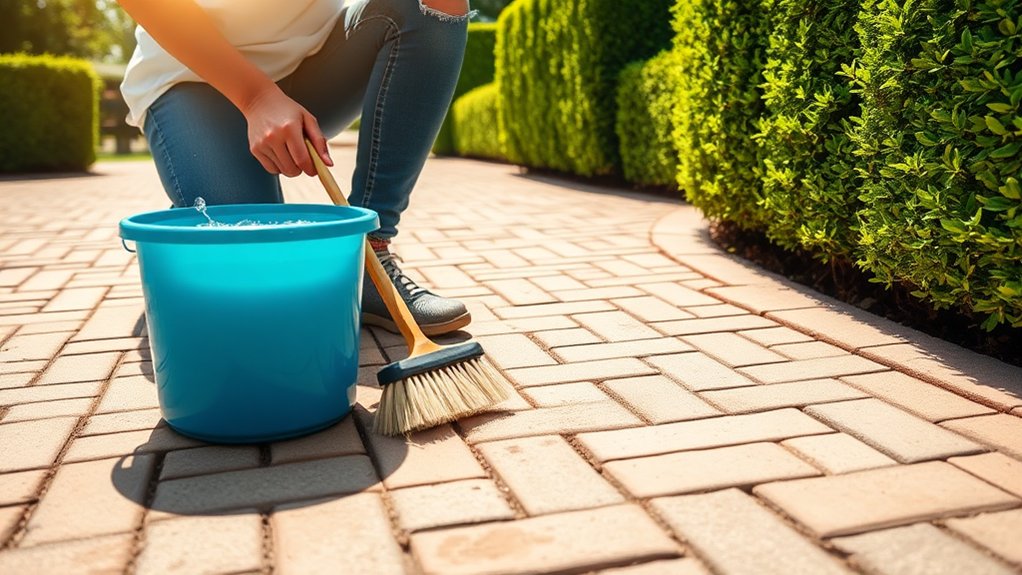
Before you start cleaning your block paving driveway, it’s important to take a few preparatory steps to ensure the process is safe and effective.
Begin with a thorough inspection of the driveway; check for stains or damage that may need special attention. Remove any obstacles, such as vehicles and garden furniture, to create a clear workspace.
Protect nearby plants by covering them with plastic sheeting to prevent any chemical damage. Make sure to wear protective gear—gloves, safety goggles, and sturdy footwear are essential.
Check the weather forecast and aim for a dry day to reduce slipping hazards and the risk of water damage. Additionally, ensure the area is ready for cleaning to prevent any accidents during the process.
Lastly, seal off any drains to keep cleaning solutions from entering, allowing for a more controlled cleaning environment.
Removing Debris Effectively
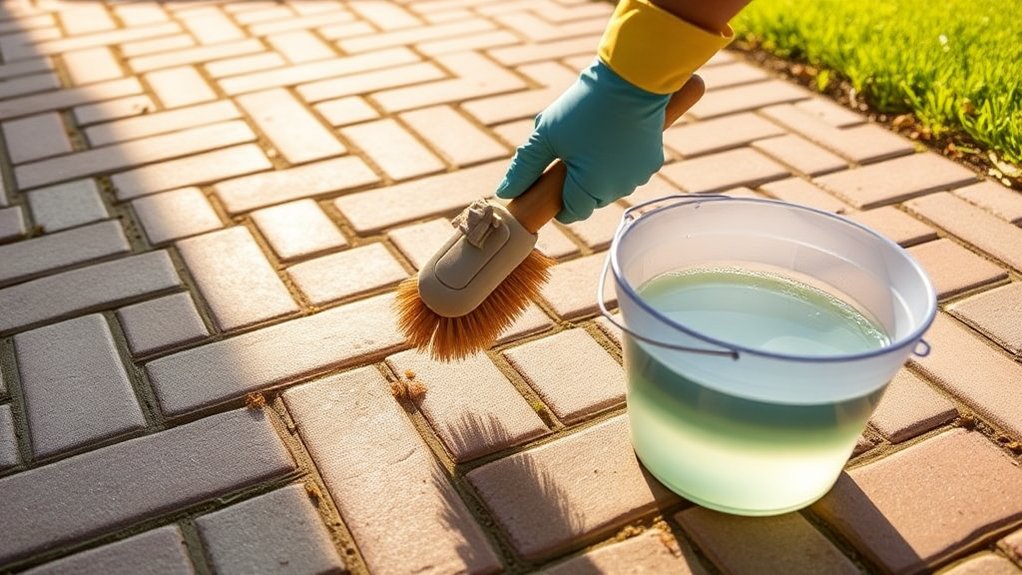
With your driveway clear of obstacles, it’s time to tackle debris removal effectively.
Begin by sweeping away loose dirt and larger debris with a broom. For stubborn weeds and moss, either pull them out by hand or use a hooked-edge tool to scrape them from the joints. Hard-bristled brushes and scrapers can help dislodge debris trapped in the joints without harming the jointing compound. For moss and lichen, steam cleaning works wonders, reaching deep into the joints. Remember that steam cleaning is particularly efficient at removing tough stains and organic growth.
Remember to dispose of all removed debris properly to avoid it settling back. Regular maintenance is key to keeping your driveway clear and prolonging its life, so make it a routine to check and clean regularly.
Choosing the Right Cleaning Solution
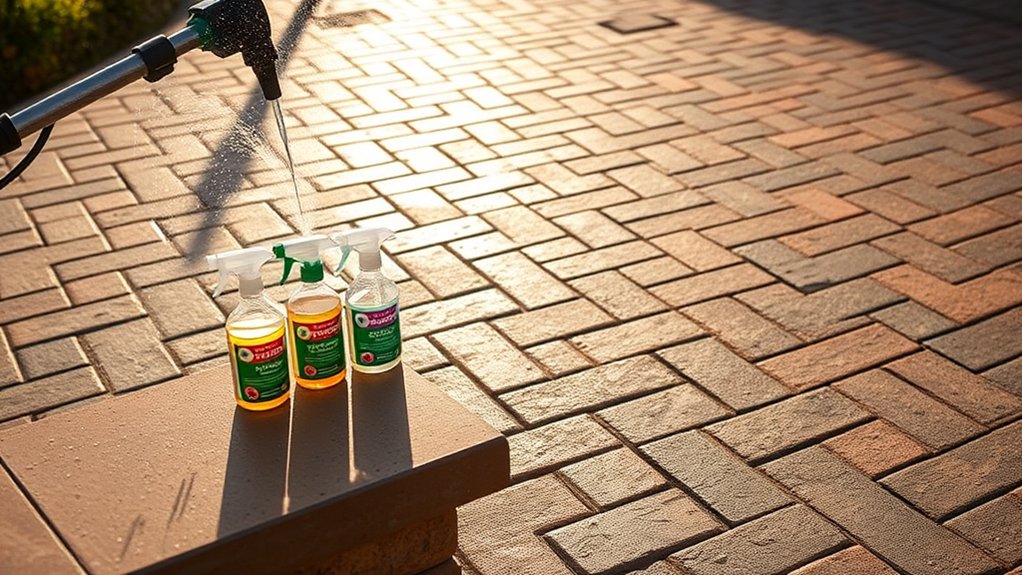
When choosing a cleaning solution for your block paving driveway, start with mild soap like washing-up liquid. It lifts dirt effectively without damaging the surface. Steer clear of acid-based cleaners, as they can erode the stones over time. Opt for eco-friendly alternatives that are both gentle and effective, ensuring your driveway and the environment are protected. For tougher issues like moss and weeds, consider using a turbo nozzle for pressure washing, as it effectively cuts through these problems without harming the surface.
Mild Soap Options
Choosing the right soap for cleaning your block paving driveway is crucial for effective results without causing damage. Mild dish soap, hand soap, or washing-up liquid are ideal options due to their gentle nature and ability to tackle dirt and light stains.
These mild detergents minimise the risk of harming your paving while still providing solid cleaning power. Make sure to mix the soap at a low concentration; too much can create excessive foam, leading to residue buildup.
Always test a small area first to ensure compatibility. Using warm water can enhance the soap’s effectiveness, helping you achieve the best results without compromising your driveway’s integrity.
Avoid Acid-Based Cleaners
When cleaning your block paving driveway, stick to mild soap options and avoid acid-based cleaners.
These harsh chemicals can damage the surface, leading to costly repairs, and may erode the sand or gravel beneath, affecting stability. They can also cause uneven discolouration, ruining your driveway’s appearance.
Plus, these cleaners can harm nearby plants and wildlife if they seep into the ground. Instead, consider safer alternatives like sodium hypochlorite solutions, which clean effectively without the risks of acid-based products.
Always prioritise the integrity of your driveway and the environment.
Eco-Friendly Alternatives
When it comes to cleaning your block paving driveway, consider eco-friendly alternatives that are gentle on both your pavement and the environment. Here are some effective options:
- Vinegar: This natural disinfectant, when diluted with water, acts as a mild degreaser.
- Baking soda: An abrasive yet gentle choice, great for tackling stains.
- Lemon juice: Combine with baking soda for a powerful stain-fighting duo.
- Washing powder: Great for removing moss and algae without the need for scrubbing.
- Biodegradable soap: Perfect for general cleaning and stain removal.
These eco-friendly solutions help reduce chemical runoff, protect your plants and pets, and are often more cost-effective, all while keeping your driveway in top shape.
Applying the Cleaning Solution
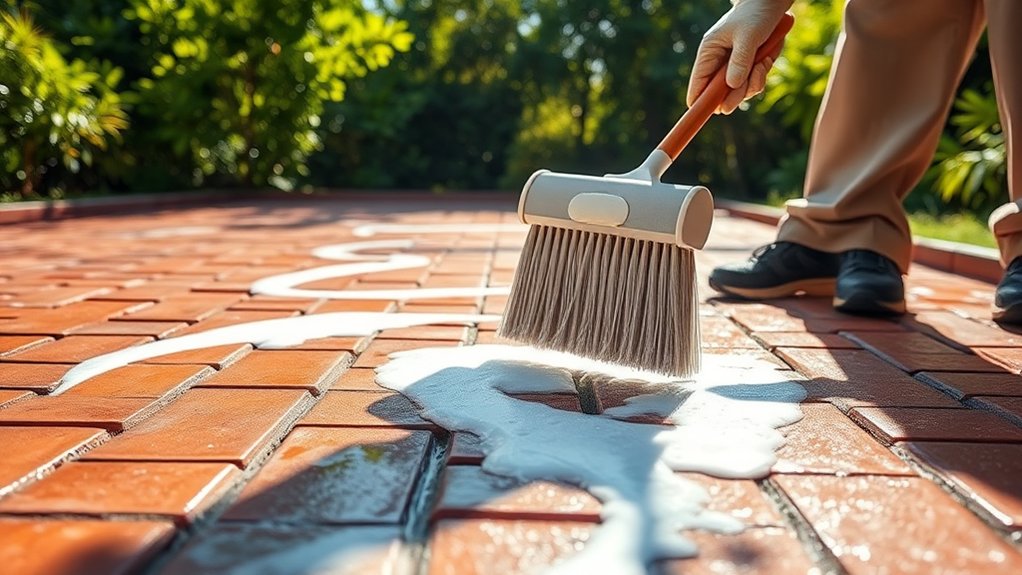
Now that you’ve mixed the cleaning solution properly, it’s time to apply it effectively.
Work in sections, pouring or spraying the solution evenly across the driveway, paying particular attention to heavily soiled areas.
As you scrub, use the right techniques to ensure the solution penetrates deeply into the surface for the best results.
Mixing Cleaning Solution Properly
Once you’ve mixed your cleaning solution, it’s time to apply it properly to your block paving driveway.
Follow these straightforward tips for the best results:
- Use a garden or backpack sprayer for even coverage.
- During the initial application, avoid brooms or brushes; just focus on wetting the surface.
- Ensure your tools are clean and free from any old residues.
- Stir the solution well before use to achieve a uniform mix.
- Only prepare what you need to avoid it degrading if left stored.
Applying Solution in Sections
To clean your block paving driveway effectively, it’s important to apply the cleaning solution in sections.
Start by deciding on a section size that suits your time and effort; smaller sections are easier to manage and allow for better cleaning. Before you begin, clear away any loose debris and protect nearby areas.
Pour or spray the solution evenly over each section, making sure to cover it without creating pools. Apply only as much solution as you can work with before it dries, and avoid overlapping to prevent using too many chemicals.
Work diagonally to reduce stress on the joints. Once you finish a section, rinse away the solution and dirt before moving on to the next one.
This approach ensures consistent cleanliness across your driveway.
Scrubbing Techniques to Use
When applying the cleaning solution, it’s crucial to use effective scrubbing techniques to ensure thorough dirt removal without harming the block paving.
Here are some tips for best results:
- Scrub Diagonally: This method helps to protect the jointing compound and kiln-dried sand.
- Use Hard-Bristled Brushes: These are great for lifting dirt while safeguarding the surface.
- Apply Gentle Pressure: Avoid using too much force to prevent dislodging the blocks.
- Maintain a Steady Motion: Keep your scrubbing consistent for an even clean across all areas.
- Check Your Progress: Frequently assess how clean the surface is to determine if you need to scrub more.
Techniques for Pressure Washing
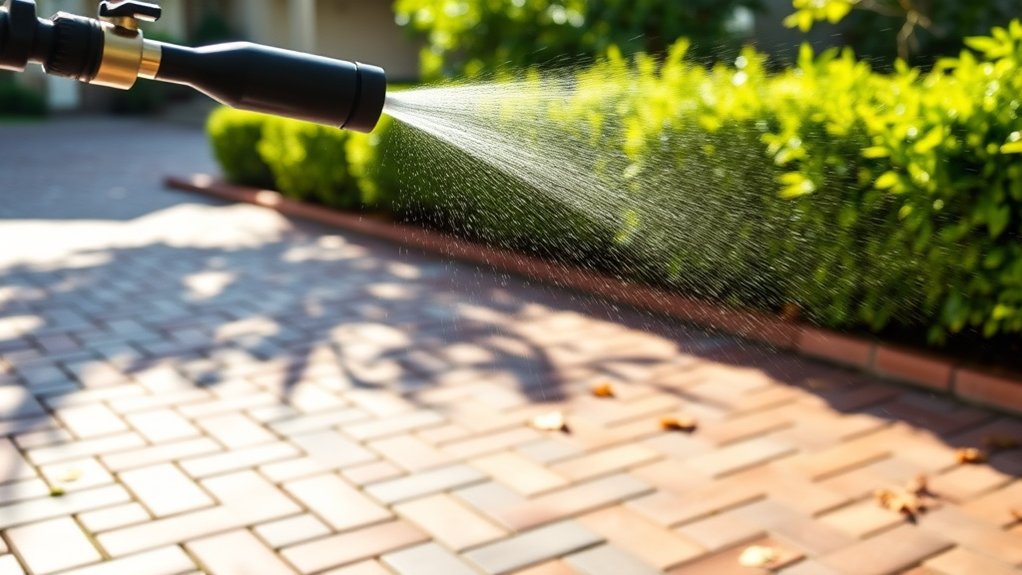
Before starting the pressure washing process, it’s important to prepare your block paving driveway. Clear away any obstacles and debris, then sweep the surface with a stiff broom.
Ensure all electrical connections are secure, and remember to wear protective clothing, such as gloves and safety glasses.
When setting up your pressure washer, connect it to a water supply and power source. Opt for a low to medium-pressure setting that’s suitable for block paving.
Use an appropriate nozzle, like a rotary head attachment, and follow the cleaning product instructions carefully.
Begin washing at one end of the driveway, keeping the nozzle at a 45-degree angle to prevent damage, especially near the joints.
Ensuring Proper Joint Refilling
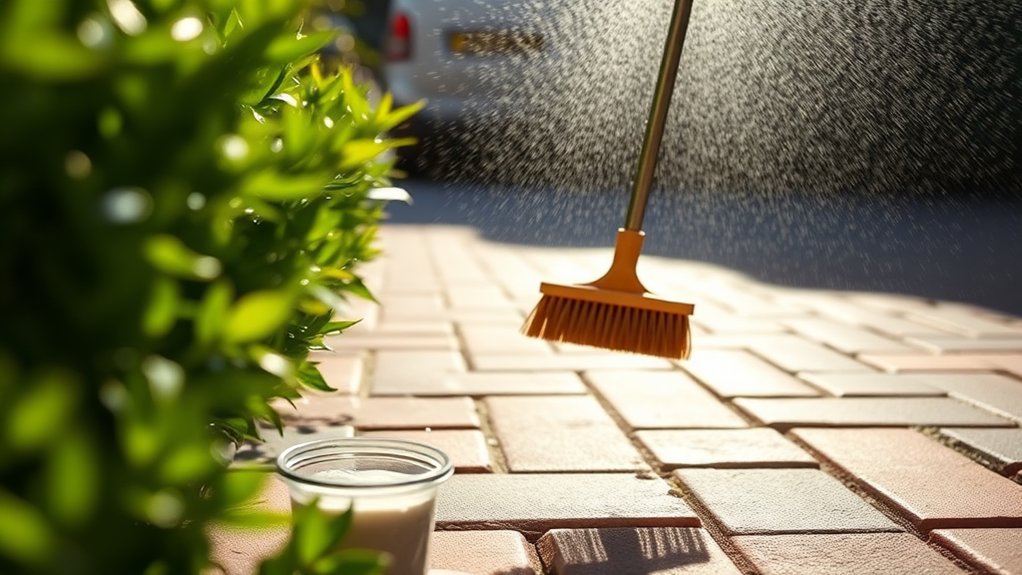
After pressure washing your block paving driveway, it’s crucial to refill the joints properly to keep it looking good and lasting longer. Here’s how to do it effectively:
- Use fine-grade jointing sand that suits your joint types for the best results.
- Ensure the surface is dry before applying sand to help it compact well.
- Brush the sand into the joints, compact it down, and add more if there are any low spots.
- Clear away any excess sand straight away to avoid staining.
- Keep an eye on the joints and refill as necessary to ensure stability and prevent weeds from growing.
Finishing Touches After Cleaning
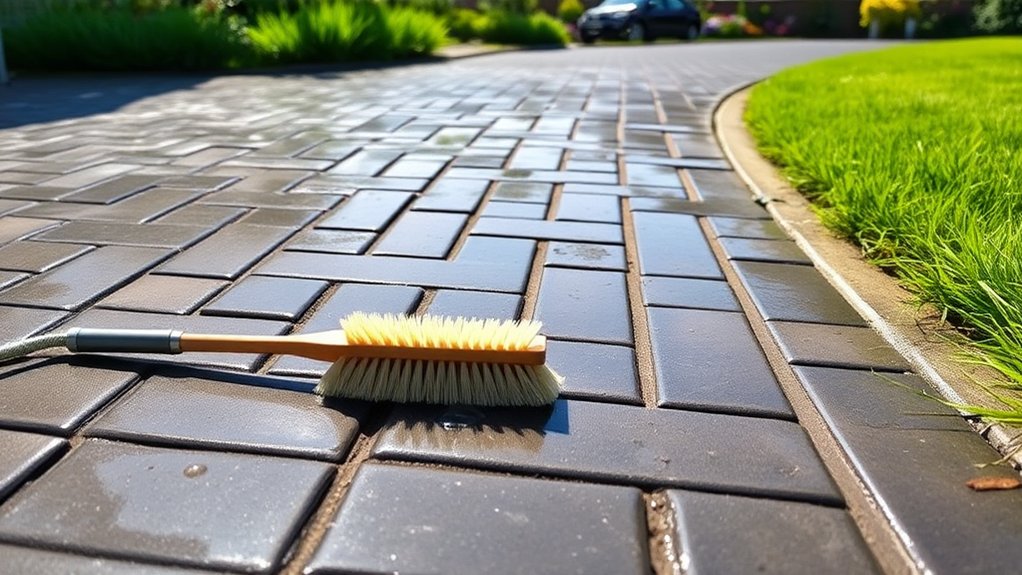
After you’ve thoroughly cleaned your block paving driveway, it’s crucial to add the finishing touches to improve its appearance and durability. Start with a post-cleaning inspection—look for any uneven pavers, leftover residue, or issues with joint stability. Then, choose the right sealer that matches your paver material and ensure the surface is completely dry before application.
Here’s a straightforward guide for sealing:
| Step | Details |
|---|---|
| Choose Sealer | Select one that suits your paver material |
| Test Patch | Try a small area first, preferably hidden |
| Apply Coverage | Use thin, even layers to avoid pooling |
| Monitor Curing | Keep off the surface for at least 24 hours |
Following these steps will help maintain the quality and appearance of your driveway for years to come.
Regular Maintenance Tips
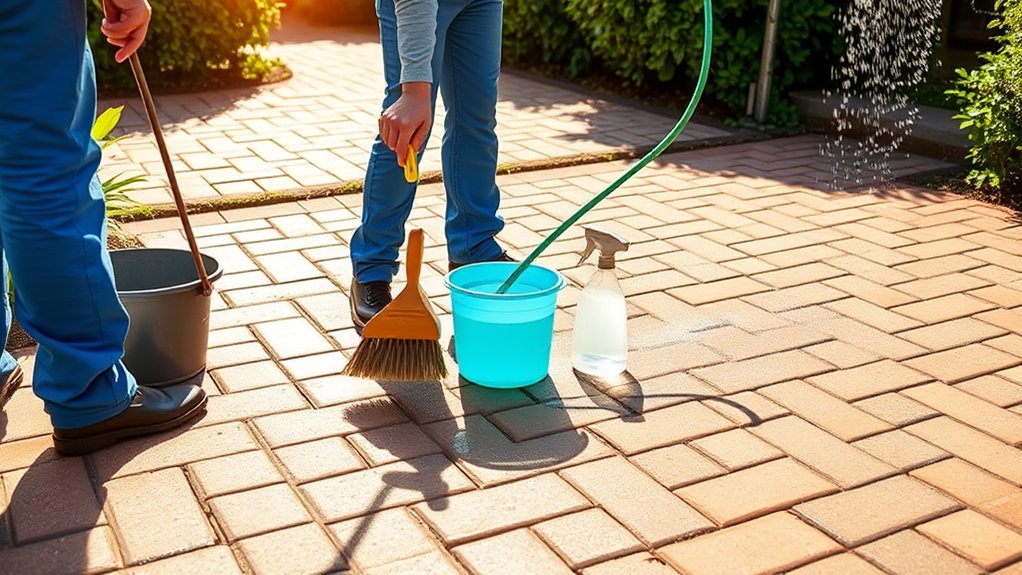
To keep your block paving driveway looking its best and ensure it lasts, regular maintenance is key. Here are some straightforward tips:
- Sweep regularly to clear away leaves and dirt, which can stain the surface.
- Inspect each season for any cracks or settling, addressing issues early on.
- Reapply sealant every few years to maintain its appearance and protect against spills.
- Clean up spills quickly with mild detergent to prevent stains from setting in.
- Fill gaps between the blocks with sand to keep everything stable.
Following these simple steps will help you enjoy a tidy and durable driveway for years to come.
Protecting Against Weeds and Moss
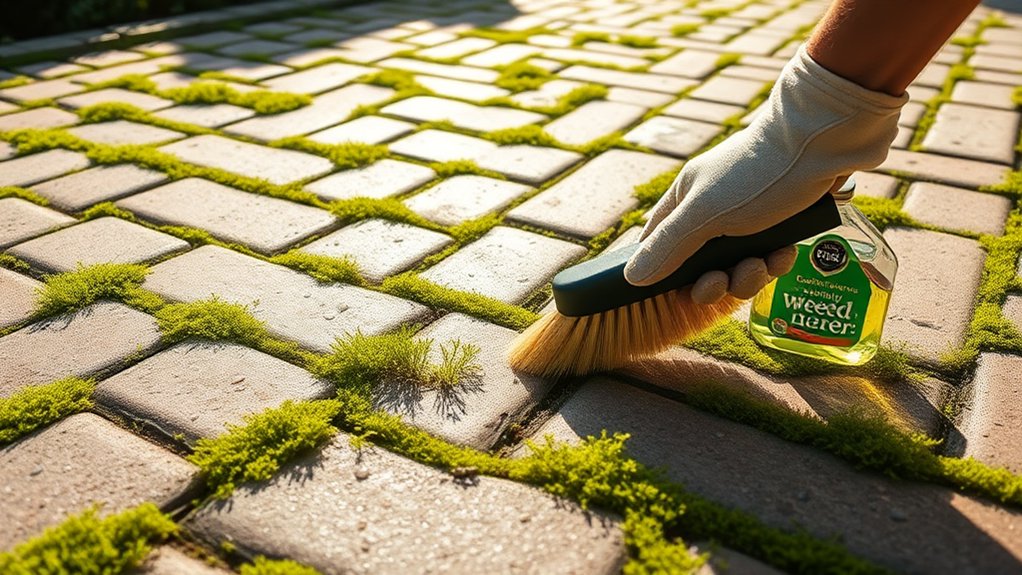
To keep your block paving driveway clear of weeds and moss, regular upkeep is vital. Employ effective weed control methods and moss prevention techniques to maintain its condition and appearance. Combining physical removal, chemical treatments, and proper sealing will provide a strong defence against unwanted growth. For instance, using a pressure washer can help remove moss, while a quality sealant can deter future growth. Additionally, implementing regular cleaning of the surface significantly reduces chances of weed establishment.
Regular Maintenance Practices
To keep your block paving driveway in top shape, regular maintenance is key to preventing weeds and moss.
By sticking to a cleaning routine and taking some simple precautions, you can significantly limit moss growth.
Here are some straightforward practices to follow:
- Sweep regularly with a stiff broom to remove debris from the joints.
- Trim back overhanging shrubs and trees to allow more sunlight and airflow.
- Check for leaks and fix any issues to avoid excess moisture.
- Reapply a surface treatment after cleaning for extra protection.
- Ensure proper drainage so that water flows away from the paving.
Effective Weed Control Methods
While it may be tempting to let weeds and moss take over your block paving driveway, effective weed control methods can keep it looking sharp.
Start with organic approaches like pouring boiling water or a mix of salt and water to tackle weeds without harming your pavers. For tougher weeds, manual removal with a flathead screwdriver works well.
If you prefer chemical solutions, opt for organic herbicides to minimise health risks. Sealing your block paving and filling gaps with sand can also prevent future weed growth. Additionally, consider installing a weed control membrane to block sunlight and further deter weed establishment.
Regular maintenance, such as sweeping away debris, further reduces the likelihood of weeds. Following these tips will help you maintain a tidy and weed-free driveway.
Moss Prevention Techniques
Moss can quickly turn your block paving driveway into an eyesore if left unchecked, so it’s important to adopt effective prevention techniques.
Here are some straightforward strategies to reduce moss growth:
- Regularly sweep up leaves and debris to keep surfaces dry.
- Prune trees and shrubs to increase sunlight and improve airflow.
- Identify and repair damp spots caused by leaks or poor drainage.
- Use natural moss killers, such as a vinegar solution, to combat regrowth.
- Schedule regular inspections and maintenance to spot early signs of moss.
Dealing With Oil and Fuel Spills
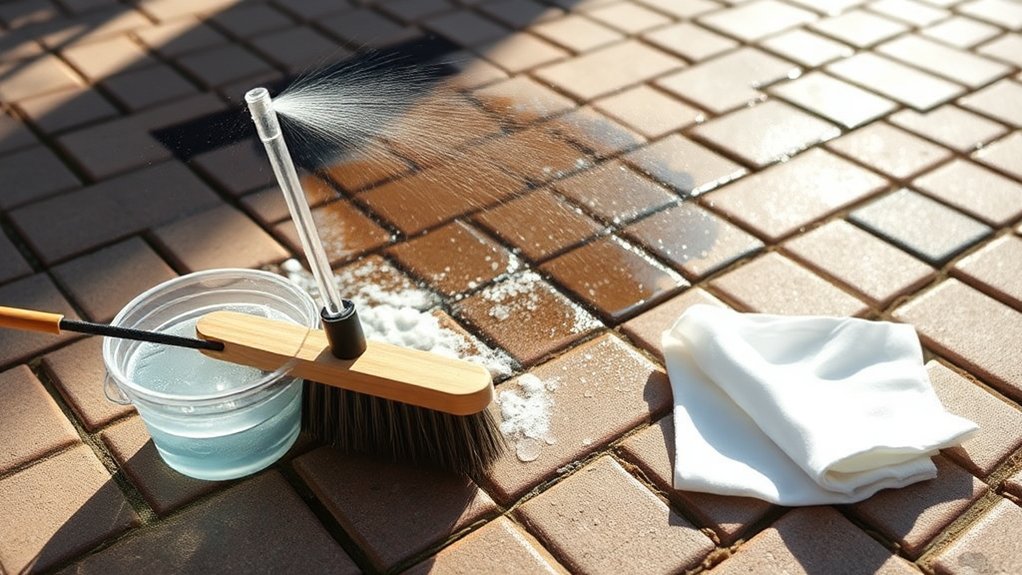
If you spot an oil or fuel spill on your block paving driveway, it’s important to act quickly to avoid a permanent stain.
Start by blotting up any excess oil with rags or paper towels—press down firmly but don’t rub, as this can spread the stain.
Next, cover the spill with absorbent material like kitty litter and leave it for 15–30 minutes to absorb the remaining oil.
Once that’s done, apply a grease-cutting agent, such as washing-up liquid or a commercial degreaser.
Let it sit for 20–30 minutes, then gently scrub with a nylon-bristle brush.
Finally, rinse the area thoroughly with hot water.
Avoid using a pressure washer unless absolutely necessary, as this can damage your driveway.
Seasonal Care for Driveways
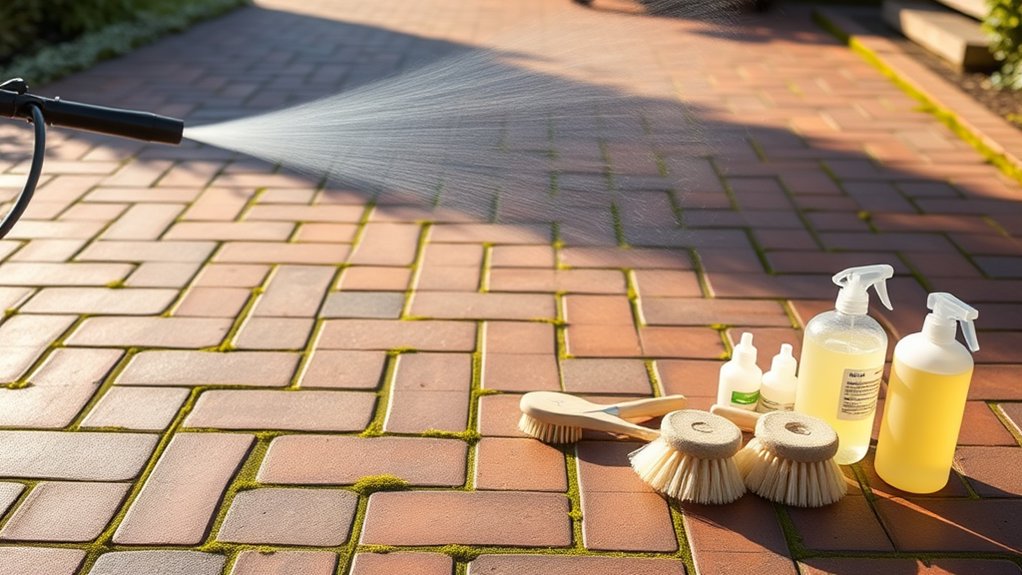
To keep your block paving driveway in top shape all year round, it’s important to adjust your maintenance based on the seasons. This helps maintain its appearance and prevents long-term damage.
- Autumn: Regularly clear away leaves and debris to prevent staining.
- Winter: Use sand or a salt-free ice melt for traction, steering clear of harsh chemicals that can damage the paving.
- Spring: Give your driveway a thorough clean to remove any grime accumulated over winter.
- Summer: Check for weeds and cracks, and tackle these issues promptly to avoid further damage.
- Year-Round: Keep an eye out for any signs of wear or settlement to catch problems early.
Considering Sealants for Protection
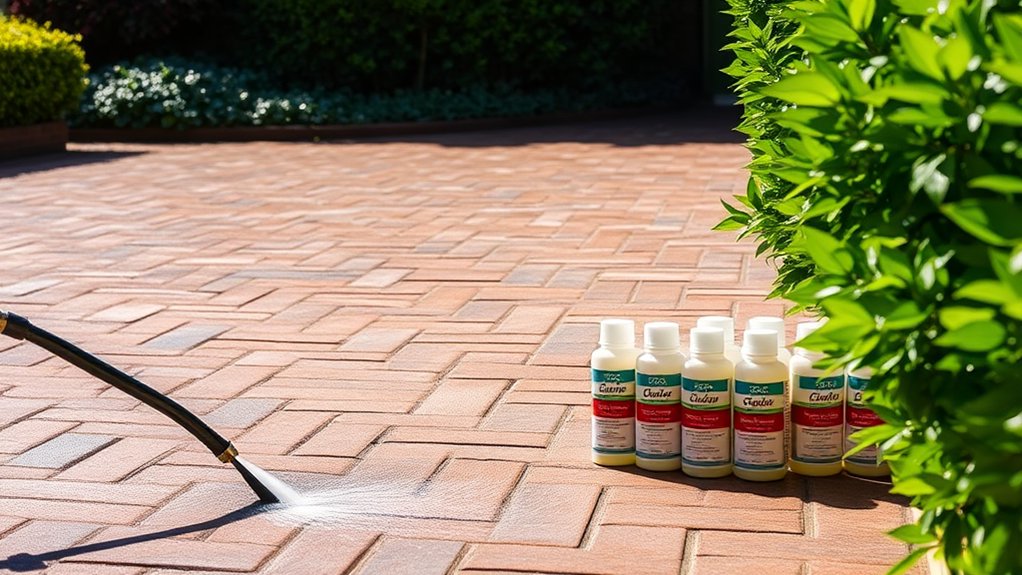
Choosing the right sealant for your block paving driveway is crucial for long-lasting protection and maintaining its visual appeal. Sealants provide a barrier against oil, grease, and stains, as well as preventing weed and algae growth.
They also improve resistance to weather, helping your driveway endure freeze-thaw cycles and UV damage. However, be aware of the potential downsides. Low-quality sealants can peel or become slippery, and some may change the look of your pavers. It’s wise to test a small area before applying it to the entire surface.
While sealants can be an investment, their protective benefits often outweigh the drawbacks, especially in high-traffic areas. Additionally, considering the long lifespan of resin driveways may also influence your decision on maintenance and sealant needs for block paving.
Frequently Asked Questions
How Often Should I Clean My Block Paving Driveway?
You should clean your block paving driveway at least once a year, especially with the changing seasons. Regular sweeping and spot cleaning can help maintain its appearance and prevent long-term damage. For instance, after autumn, it’s wise to clear away fallen leaves to avoid staining. Keeping it tidy will ensure your driveway stays looking its best.
Can I Use Bleach to Clean My Driveway?
“Don’t put all your eggs in one basket.” While bleach can be an effective cleaner, it’s worth exploring eco-friendly alternatives for maintaining your driveway. Regular maintenance is essential; using bleach sparingly can help avoid discolouration and damage to your paving. For instance, a simple solution of vinegar and water can often do the trick without harsh chemicals.
What Should I Do if My Paving Stones Are Stained?
If your paving stones are stained, start by identifying the type of stain for effective removal. Use suitable cleaning methods and products that are safe for stone. Regular maintenance and sealing can help prevent future stains and improve durability. For instance, if you have oil stains, a degreaser specifically for stone can work wonders. Keep it simple and consistent for the best results.
Is It Safe to Use a Weed Torch on My Driveway?
Using a weed torch on your driveway can be effective for tackling stubborn weeds, but it’s essential to prioritise safety. Ensure there’s no flammable debris nearby, wear appropriate protective gear, and take care not to damage your pavement.
How Can I Prevent Weed Growth in My Driveway?
To stop weeds from growing in your driveway, use preventative measures such as applying weed-suppressing sand. Regular maintenance is key—make sure to manually remove weeds and inspect the gaps to keep them clean. This reduces the conditions that allow weeds to germinate.
Conclusion
By following these steps, you can keep your block paving driveway looking immaculate for years. A well-maintained driveway can enhance your property’s value by as much as 10%. Just think about how a clean, vibrant surface can improve your home’s curb appeal. Regular upkeep not only boosts aesthetics but also protects your investment. So, gather your cleaning supplies and give your driveway the attention it needs; it’ll be worth it in the long run!
Adding curb appeal to your home is easier than you think! With the right design ideas, your resin driveway can Read more
Are you tired of the dull, worn-out look of your block paving? Well, have you ever considered putting resin over Read more
Are you considering whether to choose resin or block paving for your next project? Well, here's an interesting statistic for Read more

